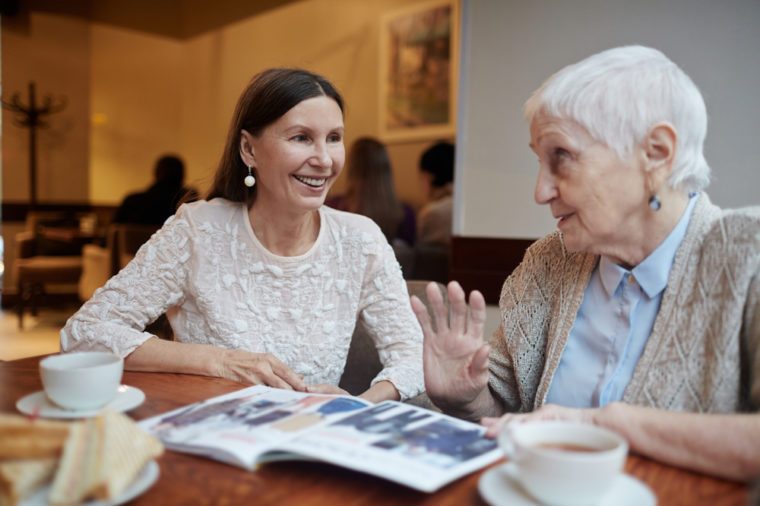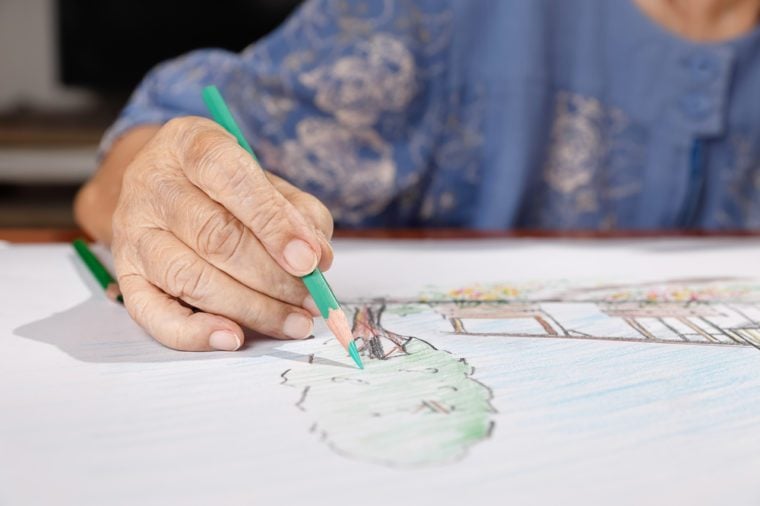Original article posted on Readers Digest
Memory loss can be scary, but patience, trust, and encouragement can help your loved one continue living a meaningful life. Every stage of Alzheimer’s is unique

You might assume anyone with Alzheimer’s is unable to keep up with a conversation, but that’s not the case. Those in the early stages have memory problems that make it easy to get lost or forget conversations, while personality changes or agitation might show up during the middle stages, says Mary Mittelman, DrPH, director of the Alzheimer’s Disease and Related Dementias Family Support Program and research professor in the department of psychiatry at NYU Langone. When the late stage hits, your loved one might have trouble getting dressed or eating. “Symptoms of Alzheimer’s change over time,” Dr. Mittelman says. “If I say something about the early stage, it’s not relevant to the middle stage.”
Life is still pretty normal in the early stage

“I lead a largely normal life, but there are specific areas where I rely on a planner or alarm clock or smartphone,” says Eric Thompson, advisor on the Early-Stage Advisory Group for the Alzheimer’s Association. After receiving his diagnosis about four years ago, he had to retire and make a few changes to his routine, like taking care of his checklist of daily chores first thing in the morning so he doesn’t forget, but he says people are shocked by how well he remembers conversations. Don’t miss this breakthrough that could reverse Alzheimer’s.
I might notice my symptoms more than you do

During the early stages of Alzheimer’s disease, the changes in memory might be so subtle that you wouldn’t notice unless you spent a fair amount of time around the person. But that doesn’t mean you should undermine the condition or assume things haven’t gotten harder. “Half a dozen people have said, ‘You don’t have Alzheimer’s,’ and they say, ‘You seem normal,’” Thompson says. “After they’ve been around me for a while, I’ll see them a week later and they say they told me that the last time we talked. There’s something wrong, something different.” These are 10 of the earliest signs of Alzheimer’s disease.
I don’t forget things on purpose

You might be aggravated that you have to keep repeating yourself to someone, but don’t let your impatience get the best of you. Instead, just simplify the way you say things so your words are more likely to stick, Dr. Mittelman says. “If I say, ‘I told you before,’ which you could be tempted to do after 50 times, it just upsets the person because he doesn’t remember,” she says. “Just calmly tell him again without referring to the fact that you said it before. It makes it less likely an argument will occur.” Stop believing these myths about Alzheimer’s disease.
Reminding me my loved ones are dead is devastating

When your loved asks about a spouse who passed away, don’t cause unnecessary heartbreak by saying the person isn’t here. Instead, offer to take your loved one on a walk to look for that person, says Jackie Pinkowitz, MEd, board chair of Dementia Action Alliance. “You can’t expect that person to kind of come back into where you’re at, but you can be nice and kind of be where they are,” says Pinkowitz, who was a caregiver for her mom and her father-in-law, both of whom had dementia. “Share the moment, but be willing to kind of go into their world a little.”
Socializing is important to me

Especially for someone in the early stages, who has just mild cognitive impairment, don’t force someone with Alzheimer’s to stay home when your loved one could be spending time with friends. “Unfortunately, some family members just disable them more rather than enabling them and encouraging them to be involved,” Pinkowitz says. Let a loved one continue being involved in the community or the arts. In fact, maintaining strong friendships is one of the habits that may help prevent dementia in the first place.
I can do more than you’d think

You might be surprised that in the early stages, people are still able to drive cars. Thompson says that with the help of a GPS and an app that reminds him where he parked, he’s able to get around. But he’s found that his ability to drive makes some people are skeptical he has Alzheimer’s in the first place. “They say, ‘You communicate well and are driving,’” he says. “I can drive, but I need a GPS to drive anywhere.”
You can help me get involved

As everyday tasks become harder, it’s common for people with Alzheimer’s or their families to assume that they can’t participate in activities that they used to. But depending on your loved one’s stage, he or she might still be able to do those things, just with alterations—though it might be up to you to extend the invitation. “Some people in early stages become apathetic and withdraw from people around them,” Dr. Mittelman says. “It’s less easy to initiate pleasant activities. It’s important to try and include people with dementia as much as possible.”
I want to make decisions

“They feel like their rights to making decisions and everything, their dignity, their self-determination is taken away from them,” Pinkowitz says. Listen to what your loved one has to say instead of assuming a person with Alzheimer’s can’t make a solid decision. Start these habits to keep your brain young.
I want a meaningful life

Alzheimer’s can shake up everyday life in a way that can make it hard to bounce back. But that doesn’t mean you should abandon loved ones and let them spend all their time alone at home. Thompson said early retirement was a struggle when he didn’t know what to do with his days. But getting involved with Alzheimer’s Association has given him the chance to go to museums, attend support meetings, give speeches, and go to conferences. “It gave me a new purpose, a new way to be involved and active and engaged,” he says. “I never thought my life would be enriched the way it has.” See if there’s a similar organization in your local area to keep your loved one active.
I enjoy the same things I used to

Often, even after people start forgetting facts, they can still remember and enjoy things like drawing, painting, or listening to music. “The person may seem as if they can’t get engaged, but if they were an artist and you put those things in front of them, they will start drawing something or painting,” Pinkowitz says. “It’s different because it’s almost in their muscle memory, like part of who they are.” She recommends putting a headset on a loved one who’s sitting alone without talking. That way, the person can listen to some favorite songs from his or her generation.
Music is especially enjoyable

While people in early or middle stages might love joining a choir or playing the piano, those in the late stage will still appreciate listening to music. “Music is a great way to reach people at every stage,” Dr. Mittelman says. “They wake up because music stimulates them and they get pleasure out of it. Those ways of communicating that aren’t necessarily verbal can create pleasure for everyone.” Pinkowitz recommends putting a headset on a loved one who’s sitting alone without talking so the person can listen to some favorite songs from his or her generation.
My other health conditions need attention too

Someone with Alzheimer’s might be less patient when waiting for a doctor or become agitated, but it’s important to insist your loved one still continues with regular visits to the doctor and dentist. “All of the other conditions and illnesses that can occur without dementia can occur with people with dementia as well,” Dr. Mittelman says. “There are ways in which symptoms can be exacerbated if those things are not in place and can be reduced if other illnesses and conditions are attended to.”
Alzheimer’s can hit young

Thompson was 54 when he received his diagnosis. He says many people have been surprised to hear about early-onset Alzheimer’s, so he shares educational resources with them. “It changes the nature of the relationship and discourse. They didn’t know people in their early 50s got Alzheimer’s,” he says. “Early detection of diagnosis matters. If you think you’re having memory problems, seek medical care. It might be normal aging, and it might not be.” One of these reasons could be behind your forgetfulness.
Loud restaurants can be stressful

The chatter in a busy restaurant can make it even harder to follow a conversation, especially for someone who has uncorrected hearing loss, Dr. Mittelman says. “Very loud places like a noisy restaurant might be hard because the overstimulation of noise makes it less possible to understand the conversation around them,” she says. Try eating at a quiet café instead so that your loved one can feel more included. This diet could reduce Alzheimer’s risk by more than 50 percent.
I need help making legal arrangements

Your loved one probably needs financial planning, but might need help putting everything in place. An attorney or legal professional can help make the process less stressful and point out information you might not know about, Thompson says. “It’s not something you can do on your own without making poor decisions,” he says. “You need consulting and help.” Read on for the things neurologists do to prevent Alzheimer’s.
